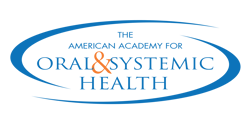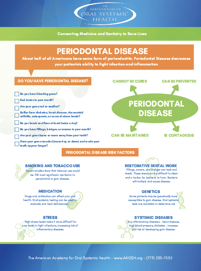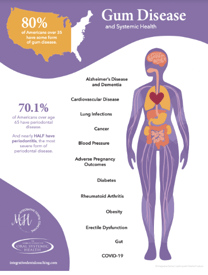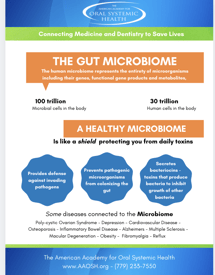Ten Important Facts That You Should Know About Oral Systemic Health.
2022 Important Facts That You need to Know About ORAL-SYSTEMIC Health
Did you know the mouth is the gateway to the rest of the body?
Research continues to show the numerous links between oral health and whole body health. For providers, it is imperative to educate patients on the risks poor oral health has on the rest of the body. For patients, it's important to be aware of the affects your daily choices make on your health. Brushing, flossing, proper nutrition, and regular dental checkups are critical for the health of you and your family! Below is a list of just few facts you or your patients need to know about their oral health.
1. Periodontal disease is a chronic inflammatory disease and has been associated with SEVERAL health conditions
Periodontal disease is a chronic inflammatory disease and can have effects on your systemic health. After the gingivitis stage of Periodontal disease, it can no longer be cured but needs to be treated and maintained. Once the infection has spread to your gums, and through your bloodstream, it becomes an oral-system issue.
Learn more about the Stages of Periodontal disease and the risks on systemic health in this post.
2. Infections in your mouth will make way to your bloodstream
Think: Bleeding or shifting gums. When the roots of your teeth are exposed, oral pathogens will travel through your bloodstream, affecting your heart and circulatory system. There are a variety of treatments available to avoid further inflammation.
2. Correlation between Diabetes and Periodontal disease
Diabetes causes a weakening of the immune system that makes you more vulnerable to infection. This puts your gums at increased risk for gum disease and infection. Once this infection becomes prevalent in the mouth, diabetic patients will have higher difficulty controlling blood sugar levels. On the flip side, all periodontal patients should know their diabetic status. 1 in 3 diabetic patients do not know they have or are at risk for diabetes.
3.Risk of adverse pregnancy outcomes associated with poor oral health
Studies have found oral pathogens in the infected placenta. Periodontal disease has been associated with low birth rates, preterm birth, and additional pregnancy complications. Poor oral health directly affects the fetus and can increase a child's future risk for developing asthma and Type 1 Diabetes.
4. Half of all American adults have some degree of Periodontal disease
Need we say more? Here is a reminder to educate your patients and encourage them to seek treatment if they have any symptoms or risk factors of periodontal disease.
5. Gum disease and tooth loss increases risk for Alzheimer’s disease
The open infections in the mouth caused by Periodontal disease make way through the bloodstream..to the brain. Based on a large study performed by the National Center of Health Statistics, adults with signs of infections in the mouth were more likely to develop Alzheimer's disease.
6. Oral bacteria are being found in brain tissue, heart vessels, joints, and many other parts of your body
The mouth and oral cavity are focal points for the interaction of the body with the external environment. Speech, chewing, swallowing, and the early stages of digestion are all vital physiological functions that involve the oral cavity, and the mouth plays a role in psychological identity.
7. Periodontal Bacteria and Hypertension
Being a chronic inflammatory disease, Periodontal infections play an important role in blood pressure. Periodontal disease increases the risk for high blood pressure by 3x. This risk increases even higher if there is active bleeding in the gums.
7. Pain is a top oral health problem for young adults
IT'S NOT NORMAL! Young adults frequently report oral health problems. However, according to an ADA study, only 30% of young adults had visited the dentist within the year. It is essential to visit the dentist regularly, but it's also important to be aware of the potential risk factors oral pain can cause or alert your dentist to.
8. Poor nutrition can damage your teeth
A poor diet leaves your mouth at risk for bacteria. Foods high in sugar, carbs and acid can weaken tooth enamel and cause decay. Decay in the mouth can lead to infection. Read more here
.png?width=547&name=Featured%20Image%20Files%20(3).png)
9. Oral health and Cardiovascular disease
As with our previous disease correlations, periodontal disease is directly linked to artery inflammation. Proper oral hygiene reduces the risk of cardiovascular disease. The risk for cardiovascular disease increases with every tooth lost! Education on the management of periodontal disease should be a top priority when dealing with high risk CVD patients. BaleDoneen is a great resource for educating patients and providers on proper care and risk factors when it comes to oral health and CVD.
10. It doesn't have to be this way! Testing is available to detect harmful pathogens and early subclinical diseases.
Saliva testing is an important step in the prevention of disease. Early detection means early treatment. Early treatment means the ability to prevent any or further bone loss which leads to infection. Salivia testing can detect a multitude of diseases linked to systemic health. View AAOSH's sponsors for testing and resources.
This importance of maintaining oral health has never been more important! Talk to your doctors and dentists, ask if they collaborate with one another, advocate for your health, and always remember the connections between oral health and systemic health.
AAOSH offers our members a full resource library of educational tools and materials. Learn more about elevating the care you provide in your community by becoming an AAOSH Member.



